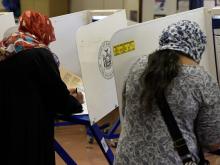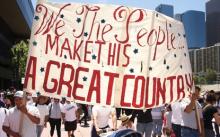associated press

THE IMAGE THAT first brought Ugandan climate activist Vanessa Nakate to many people’s attention is one that doesn’t even include her.
In January 2020, Nakate was invited to join five other young activists in a climate demonstration during the World Economic Forum annual meeting in Davos, Switzerland. An Associated Press photographer snapped a photo of Nakate standing with European climate activists Luisa Neubauer, Greta Thunberg, Isabelle Axelsson, and Loukina Tille. But when the AP published the photo that afternoon, Nakate wasn’t in it.
“Even now, well over a year after being cropped out of that photograph, it’s hard for me to talk about what happened,” wrote Nakate in her 2021 book A Bigger Picture: My Fight to Bring a New African Voice to the Climate Crisis. “By cutting me out of the photo they’d originally sent to global media organizations, the AP had denied an African activist a chance to be seen and, possibly, her message to be acknowledged.”
While the AP did some “soul-searching” following the incident, Nakate used the moment to ignite an overdue conversation about the whiteness that has long plagued the global environmental justice movement. “Being cropped out of the photo changed me,” she wrote. “I decided, from my perspective as a young African woman, that I would dedicate as much of my time as possible to addressing the many interlocking facets of the climate crisis, environmental justice, and gender discrimination — and to do so without apology or fear of erasure.”
Nakate founded the Rise Up Movement to amplify the voices of climate activists from Africa and launched a fundraising campaign for the Vash Green Schools Project to bring solar panels and cookstoves to schools across Uganda. At 25, she’s busy. And faced with a global climate emergency, it makes sense. “I don’t often get asked what recharges me,” Nakate told me when we spoke in early August. “But for me, it’s my relationship with the Holy Spirit.”
Raised in an Anglican family, Nakate became a born-again Christian as a teenager. “Activism can be very hard and prayer and attending services (or, in Covid times, watching online) have been extremely important sources of love, grace, and support,” she wrote in the acknowledgments of A Bigger Picture.
“If I feel distraught or disturbed by anything, I know the Holy Spirit will remind me of the peace that surpasses all human understanding,” she later told me. I spoke with Nakate via Zoom about her Christian faith, the role social media plays in her activism, and why we can’t eradicate poverty without addressing the climate crisis. — Christina Colón

“The picture is mixed,” said Besheer Mohamed, a senior researcher at the Pew Research Center who specializes in religion.
“On the one hand, its seems clear that Muslims are a pretty small part of the population. On the other hand, they are concentrated in some states and metro areas that might increase their voting powers in those specific areas.”

The Associated Press announced Tuesday it is dropping the term "illegal immigrant" from its Stylebook. Citing concern for “labeling people, instead of behavior,” AP’s Senior Vice President and Executive Editor, Kathleen Carroll, wrote, “The Stylebook no longer sanctions the term 'illegal immigrant' or the use of 'illegal' to describe a person. ...'Illegal' should describe only an action.”
This change is a huge win for those working on immigration reform, including the staff at Sojourners. Last fall, Sojourners joined many others in calling on the Associated Press to change the term.
“The media’s usage of the word 'illegal' is dehumanizing and distorting," wrote Sojourners Immigration Campaigns Fellow Ivone Guillen in October. "When used by journalists, it introduces a bias into their reporting and risks prejudicing the reader against the needs, concerns, and humanity of immigrant communities, regardless of their documentation status.”

In mid-December, the Religion Newswriters Association released its top 10 religion stories of the year.
The Associated Press now has its annual poll of U.S. editors and news directors and their choices for the top news stories of 2011.
Since this exercise is certainly a subjective one, your list might also be different from mine or the AP's. What would you add or delete from these lists?